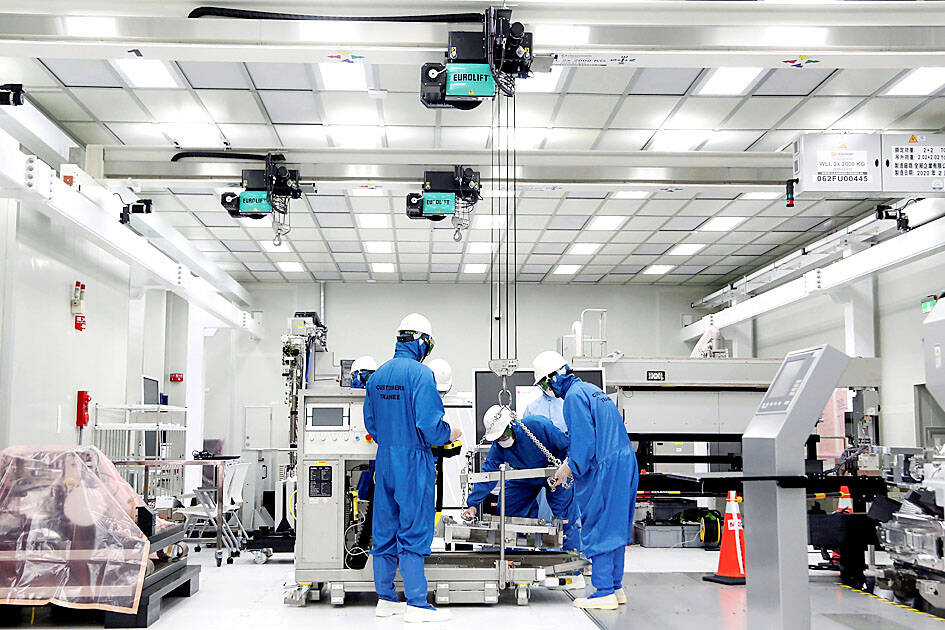Taiwan took the top spot in global semiconductor equipment spending in the second quarter of this year, up from third place the previous quarter, with the country’s manufacturers keen to invest in expansion, global semiconductor trade association SEMI said on Wednesday.
Taiwanese firms spent US$6.68 billion buying semiconductor equipment from the April to June period, up 37 percent from a quarter earlier, SEMI data showed.
Second-quarter spending was also up 32 percent from a year earlier, the data showed.

Photo: Ann Wang, Reuters
Although the second quarter is traditionally a slow season in the global semiconductor industry, many Taiwanese firms poured funds into expanding production and upgrading technology to maintain a lead over industry peers, analysts said.
Taiwan Semiconductor Manufacturing Co (TSMC, 台積電), the world’s largest contract chipmaker, was one of the biggest investors in equipment to develop advanced processes, they said.
TSMC plans to spend about US$40 billion in capital expenditure this year as it is about to start using a 3 nanometer process this year, while it is also developing a more sophisticated 2 nanometer process.
As demand for TSMC’s 7 nanometer and 5 nanometer processes remain solid for emerging technologies such as high-performance computing devices, 5G applications and automotive electronics, TSMC needed more capacity, analysts said.
Full capacity utilization is expected to continue until the end of the year, TSMC said.
China spent US$6.56 billion buying semiconductor equipment in the second quarter, down 13 percent from the previous quarter, and also down 20 percent from a year earlier, to take the second spot, falling from first place in the first quarter, SEMI data showed.
Analysts said the fall was largely a result of a ban imposed by the US government on selling certain types of semiconductor equipment to China, while that country’s “zero COVID” policy also hurt demand.
South Korea placed third after buying US$5.78 billion worth of semiconductor equipment, up 12 percent from the previous quarter, but down 13 percent from a year earlier, falling from the second spot in the first quarter, the data showed.
In the second quarter, global semiconductor equipment spending totaled US$26.43 billion, up 7 percent from a quarter earlier and up 6 percent from a year earlier, SEMI said.
Because pure foundry operators such as TSMC are raising production capacity, semiconductor equipment spending is expected to grow this year, said SEMI Taiwan president Terry Tsao (曹世綸), who is also the group’s global chief marketing officer.

RECYCLE: Taiwan would aid manufacturers in refining rare earths from discarded appliances, which would fit the nation’s circular economy goals, minister Kung said Taiwan would work with the US and Japan on a proposed cooperation initiative in response to Beijing’s newly announced rare earth export curbs, Minister of Economic Affairs Kung Ming-hsin (龔明鑫) said yesterday. China last week announced new restrictions requiring companies to obtain export licenses if their products contain more than 0.1 percent of Chinese-origin rare earths by value. US Secretary of the Treasury Scott Bessent on Wednesday responded by saying that Beijing was “unreliable” in its rare earths exports, adding that the US would “neither be commanded, nor controlled” by China, several media outlets reported. Japanese Minister of Finance Katsunobu Kato yesterday also

Jensen Huang (黃仁勳), founder and CEO of US-based artificial intelligence chip designer Nvidia Corp and Taiwan Semiconductor Manufacturing Co (TSMC, 台積電) on Friday celebrated the first Nvidia Blackwell wafer produced on US soil. Huang visited TSMC’s advanced wafer fab in the US state of Arizona and joined the Taiwanese chipmaker’s executives to witness the efforts to “build the infrastructure that powers the world’s AI factories, right here in America,” Nvidia said in a statement. At the event, Huang joined Y.L. Wang (王英郎), vice president of operations at TSMC, in signing their names on the Blackwell wafer to

‘DRAMATIC AND POSITIVE’: AI growth would be better than it previously forecast and would stay robust even if the Chinese market became inaccessible for customers, it said Taiwan Semiconductor Manufacturing Co (TSMC, 台積電) yesterday raised its full-year revenue growth outlook after posting record profit for last quarter, despite growing market concern about an artificial intelligence (AI) bubble. The company said it expects revenue to expand about 35 percent year-on-year, driven mainly by faster-than-expected demand for leading-edge chips for AI applications. The world’s biggest contract chipmaker in July projected that revenue this year would expand about 30 percent in US dollar terms. The company also slightly hiked its capital expenditure for this year to US$40 billion to US$42 billion, compared with US$38 billion to US$42 billion it set previously. “AI demand actually

RARE EARTHS: The call between the US Treasury Secretary and his Chinese counterpart came as Washington sought to rally G7 partners in response to China’s export controls China and the US on Saturday agreed to conduct another round of trade negotiations in the coming week, as the world’s two biggest economies seek to avoid another damaging tit-for-tat tariff battle. Beijing last week announced sweeping controls on the critical rare earths industry, prompting US President Donald Trump to threaten 100 percent tariffs on imports from China in retaliation. Trump had also threatened to cancel his expected meeting with Chinese President Xi Jinping (習近平) in South Korea later this month on the sidelines of the APEC summit. In the latest indication of efforts to resolve their dispute, Chinese state media reported that